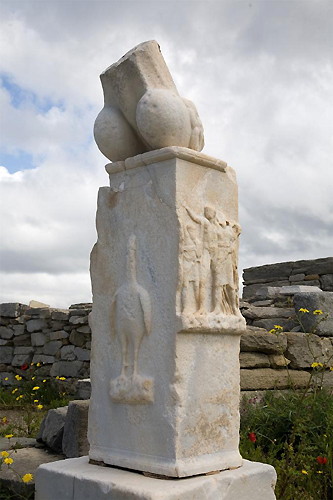Statue
representing Dionysus in the shape of a phallus, erected on the Island
of Delos around 300 B.C. These representations of Dionysus show how
the god, who led his own followers in a vortex of elation, of sensual
abandonment and ecstatic frenzy, through the wine, the dance and music,
was identified with the fertilizing energy which manifests itself in
the multifarious aspects of life. Dionysus was associated with spontaneous
vegetation, as the god of the trees (Dendrítes), of the fruits
and the flowers. He was furthermore associated with agriculture as the
god of the grapes and of wine. The god appeared under multiple aspects:
as a child, as a boy, as adult man, and had the power to transform himself
taking the shape of different animals. Phallomorphic images of Dionysus
were brought in procession, at Athens, during the Rural Dionysia (taking
place in December-January) and during the Great Dionysia (March-April).
Both these festivals were unrestrained and lively festivities, during
which the beginning of the new season was celebrated and wishes were
made for a good harvest.
[Source: http://library.artstor.org/library/]


